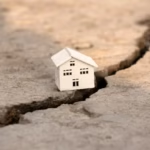In regions where earthquakes are frequent and can cause significant damage, the importance of earthquake insurance cannot be overstated. High-risk areas, particularly those along tectonic plate boundaries, are more susceptible to seismic activity that can lead to destruction of homes, businesses, and infrastructure. Earthquake insurance serves as a crucial financial safety net for individuals and families living in these vulnerable areas.
Why High-Risk Areas Need Earthquake Insurance
- Seismic Activity and Vulnerability Earthquakes are natural events that occur without warning, and they have the potential to cause massive destruction. In high-risk areas, such as those near fault lines or regions known for seismic activity, the probability of an earthquake happening is significantly higher. While these areas often have stringent building codes and engineering advancements to mitigate damage, the severity of an earthquake can still overwhelm even the best-prepared infrastructure.
- The Financial Impact of Earthquakes The financial consequences of an earthquake can be devastating. Without earthquake insurance, homeowners and businesses may be left with the enormous task of funding repairs, rebuilding efforts, and replacing lost property out of their own pockets. This financial burden can cause long-term hardship for individuals and communities, especially when recovery efforts take months or even years.
- Coverage Beyond Standard Home Insurance It is essential to understand that most standard homeowner’s insurance policies do not cover earthquake-related damages. Earthquake insurance provides specialized coverage for losses due to seismic events, including damage to the foundation, structure, and personal belongings. This extra layer of protection is invaluable for those in high-risk regions, where earthquake-induced damage can be extensive.
- Peace of Mind and Risk Management One of the primary benefits of earthquake insurance is the peace of mind it offers. Knowing that you have coverage in place can reduce the anxiety associated with living in a high-risk area. Insurance provides a financial buffer and helps families and businesses manage the risks associated with living in earthquake-prone regions. While earthquakes are unpredictable, having insurance helps mitigate the financial shock that would otherwise result from a disaster.
- The Importance of Preparedness Earthquake preparedness is not just about having an insurance policy in place; it’s also about understanding your vulnerability and taking necessary steps to safeguard your property and loved ones. While earthquake insurance won’t prevent damage, it ensures that recovery is more manageable. In high-risk areas, it is essential to regularly review your insurance policy, update coverage limits, and ensure that your property is adequately protected from seismic events.
Also Read : 365 Days Of Adventure: Protect Your Journeys With Annual Travel Insurance

Conclusion
Living in a high-risk earthquake zone comes with the reality of potential seismic events that can cause major disruptions. Earthquake insurance is a vital tool for individuals and businesses in these areas to secure their financial future. It provides crucial coverage for the damages that occur when an earthquake strikes, offering protection from the often catastrophic costs of repair and recovery. By investing in earthquake insurance, residents of high-risk areas can safeguard themselves against the unpredictable nature of earthquakes, ensuring they have the resources needed to rebuild and recover.
5 Frequently Asked Questions (FAQs) About Earthquake Insurance
1. What does earthquake insurance cover?
Earthquake insurance typically covers damage to your home’s structure, personal belongings, and any other property affected by seismic activity. This includes damage to your foundation, walls, floors, and roofs, as well as personal property like furniture, electronics, and clothing. Some policies also cover additional living expenses if you’re forced to relocate due to earthquake damage.
2. Is earthquake insurance mandatory?
No, earthquake insurance is not mandatory in most places. However, in high-risk earthquake zones, it’s highly recommended as most standard homeowner insurance policies do not cover earthquake damage. Depending on your location and the specific risks, your mortgage lender may require earthquake insurance if you live in an area prone to seismic activity.
3. How much does earthquake insurance cost?
The cost of earthquake insurance depends on various factors, including your location, the size and structure of your property, and the level of coverage you choose. In high-risk areas, premiums are generally higher due to the increased likelihood of an earthquake occurring. It’s a good idea to shop around and get quotes from different insurers to find the best coverage for your needs.
4. Does earthquake insurance cover aftershocks?
Yes, most earthquake insurance policies also cover aftershocks, which are smaller tremors that often follow a major earthquake. Aftershocks can cause significant additional damage, so it’s important to ensure that your insurance includes coverage for these events.
5. Can I add earthquake insurance to my existing homeowner policy?
In many cases, yes. Earthquake insurance is typically an add-on or rider to your existing homeowner’s policy. It’s important to speak with your insurance provider to determine if they offer earthquake coverage and how it can be integrated with your current insurance plan.





